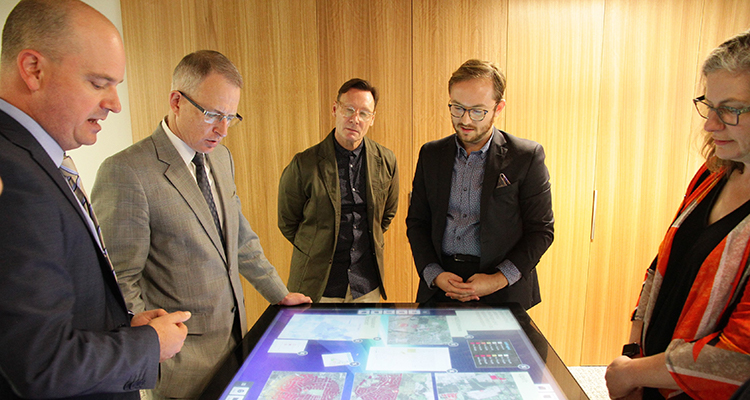
Media and staff joined the Hon. Paul Fletcher MP, Minister for Urban Infrastructure and Cities and Professor Christopher Pettit, chair of Urban Science, as they officially opened UNSW’s new City Analytics Laboratory last month.
The City Analytics Lab (CAL) is the world’s first facility dedicated to improving collaboration and information-sharing among agencies responsible for planning and designing smarter, more liveable future cities.
Mr Fletcher commended UNSW for our important work in making Australian cities smarter and more liveable. “This is an important focus for the Turnbull government as we roll out our $50 million Smart Cities and Suburbs Program, through which we are working with UNSW and other organisations including local councils, to make our cities better places to live using data and technology.”
Housed within the City Futures Research Centre as part of UNSW Built Environment, CAL uses interactive technology, big data, visualisation, virtual reality and planning models to support an interdisciplinary approach to decision-making for city planning and policy-making.
In his opening presentation, Professor Christopher Pettit explained the core focus of the lab: “City analytics is really the digital toolkit that comprises frameworks for looking at cities as systems, and the methods that we can bring to bear to try to make our cities more liveable.”
Key to this, he explained, is bringing down the barriers to information sharing – exacerbated through the use of analogue approaches and traditional technology such as websites and file sharing - that result in silos between agencies and impede collaboration and group decision-making.
“The Lab supports the multidisciplinary approach that is required when you are looking at cities. Cities are not run by one department, one agency or one group. We are trying to get people working together on the same page.”
Featuring an interactive collaboration space, the City Analytics Lab is designed to help government and industry work together to understand these technologies and new approaches to inform the planning of more liveable, productive, sustainable and resilient cities.
One of the key capabilities of the lab will be to provide data-based insights and analysis to 'what if' scenarios around transformational infrastructure.
To showcase this, Mr Fletcher and attendees were invited to engage with the lab’s RAISE (Rapid Analytics Interactive Scenario Explorer) toolkit to explore different public transit placement scenarios. Three scenarios and the associated impact assessments were presented for guests to explore using the interactive touch screen panels, before leaving feedback for others. This demonstrated the unique benefits of the City Analytics Lab as a place of information sharing and collaboration to design smarter, more liveable future cities.
- Log in to post comments
